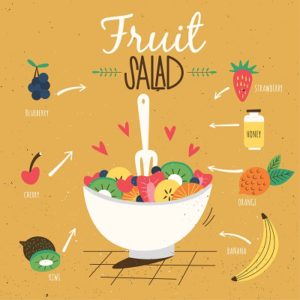 Generally speaking, sugar in fruit is not bad for us. As a matter of fact, fruit contains a natural sugar – fructose – that is better for you if you are diabetic, with the exception of pineapple and some of the melons, as the body digests fructose slower than it does sucrose or table sugar.
Generally speaking, sugar in fruit is not bad for us. As a matter of fact, fruit contains a natural sugar – fructose – that is better for you if you are diabetic, with the exception of pineapple and some of the melons, as the body digests fructose slower than it does sucrose or table sugar.
Because of the slower digestion, fructose doesn’t cause the high glycemic swings as do other types of sugars. In 2008, the American Journal of Clinical Nutrition advised diabetics to use fructose instead of sucrose as a result of studies done by researchers.
One thing you’ll notice right away is that fruits tend to taste sweeter, especially cherries and peaches, than the more tart fruits, like the citruses; regardless of the type, few fruits contain enough sugar to make them bad for you.
To give you a comparison, a 20-ounce bottle of soda has about 225 calories, 60 grams of added sugar (usually high-fructose corn syrup) and almost no nutrients. On the other hand a cup of strawberries has 50 to 60 calories, about 7 grams of natural fructose, 3 grams of fiber, and is loaded with vitamin C and minerals – all good for you.
But you do have to watch which fructose you are getting. There is natural fructose and high-fructose corn syrup. The latter is not natural and will spike your blood sugar. This is something you also have to watch when buying canned fruit. Much of it is packed in high-fructose corn syrup too. Unless it says packed in natural juices, buy either fresh or frozen fruits.
The American Heart Association recommends up to 24 grams of sugar per day for females and 36 grams for men. But you can easily exceed that if you don’t make the right selections. For example two cups of sliced bananas has 36 grams of sugar by itself. If you add in the sugar you are getting from the rest of your food, you are far in excess of what you should have each day.
Why is excess sugar bad for you? The obvious thing is it can cause tooth decay. But it also causes weight gain and increases the triglycerides in your blood stream, which have been shown to increase your risk for heart disease and high cholesterol.
Strawberries, bananas, oranges, kiwi… the healthy list goes on and on. Fruit is touted as a super-healthy snack option, but while the fiber and other nutrients found in fruit are a great part of any diet, many varieties can also be very high in sugar.
Too much sugar, regardless of where it comes from, can have some serious negative effects. (Yep, even sugar from fruit if you eat too much of it!) Does this mean run from the produce aisle screaming? Definitely not. But it might be smart to limit your fruit-based sugar consumption.






